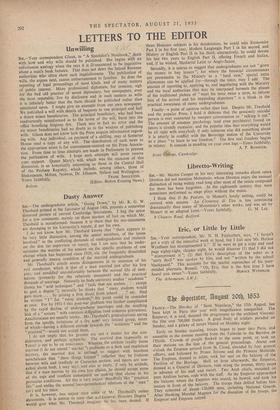Dusty Answer
SIR,—The undergraduate article, " Going Down," by Mr. R. G. W. Theobald printed in the Spectator of August 14th, presents a somewhat distorted picture of current Cambridge 'discontents. I beg the space for a few comments, mainly on those matters of fact on which Mr. Theobald is misinformed: because it is- there that his mis-statements are damaging to his University's repute, if not his own.
I do not know how Mr. Theobald knows that " there appears to be very little discussion, among the senior members, of the issues involved" in the conflicting demands of undergraduates and research on the don (as supervisor or tutor); but I am sure that he under- estimates the worries of his seniors on the specific problems of one change which has happened since 1939, viz. the frequently dissatisfied and generally uneasy condition of the married undergraduate.
Mr. Theobald's article seems disingenuous in its omission of his real standpoint; which is that of a man married just after his first year, and straddled uncomfortably between the normal life of insti- tutions (primarily for the relatively immature) and the practical demands of marriage. Naturally he finds university studies " academic " (hence .his "arid techniques " and " facts that are useless . : . except to gain a degree "); naturally he thinks that " many students would gain more . . . by joining a firm direct from school . . ." etc. Had he written "1" for " many students," his point could be conceded at once. For by 1951-3 this post-war problem was further complicated by the rapid decline of undergraduate marriages and the resulting lack of a " society " with common diffifulties (and common grievances). Anachronisms are usually tetchy. Mr. Theobald's generalisations spring from the specific irritations of a (by now) very limited group, many of which—having a different attitude towards the " academic " and the " practical "—would not accept them.
I do not imply that his grouses. are not a matter for due con- sideration, and perhaps sympathy. The married don (especially as Tutor) is apt to be an annoyance. Whereas the celibate readily treats married (1 do not intend " marital ") problems as a dark and important mystery, the married don is inclined to suggest with heartless nonchalance that "these things happen" (whether they be frictions between wife and landlady or Caesarian section; and tutors are con- sulted about both, I may say); and also to imply, if only by attitude, that if a man marries by his own free choice, he should accept some Of the tugs and conflicts consequent on making that choice in his particular conditions. All this is very unjust: dreadfully like " practical life " and unlike the normal loco-parenthetical relations of the " man " (sic) and his tutor.
It is, however, less unjust than some of Mr. Theobald's rasher statements. It is untrue to state that a General Honours Degree " would give what Mr. Theobald imagines he has been denied. If
three Honours subjects is his desideratum, he could take Economics Part I in his first year, Modern Languages Part I in his second, and History or English Part II in his third; alternatively, he could devote his last two years to English Part II, offering French and Italian, and, if he wished, Mediwval Latin or Anglo-Saxon.
Secondly, it is untrue to suggest that undergraduates are not " given the money to buy leisure "; for where the financial circumstances are presentable to the Ministry as a " hard case," special extra allowances can be applied for—through the tutor, may I add. The amount of reporting to, applying to, and negotiating with the Ministry and the local authorities that may be interposed between the phases of the traditional picture of " meet his tutor twice a term, to inform him of his arrival and his impending departure " is a blank in the practical awareness of many undergraduates.
Finally—a point of opinion rather than fact. Despite Mr. Theobald and the popular Press, I hold it dubious that the genuinely suicidal person is ever converted by inexpert conversation or " talking it out." The amount of amateur psychology (and even psychiatry) forced on tutors is already excessive; and the popular idea that everything would be all right with everybody if only someone else did something about it is utterly in conflict with the Beveridge notion of the University as a place " to learn to use freedom." The first real freedom begins in infancy. It consists in standing on your own legs.—Yours faithfully,
Jesus College, Cambridge.
A. P. ROSSITER.


























 Previous page
Previous page